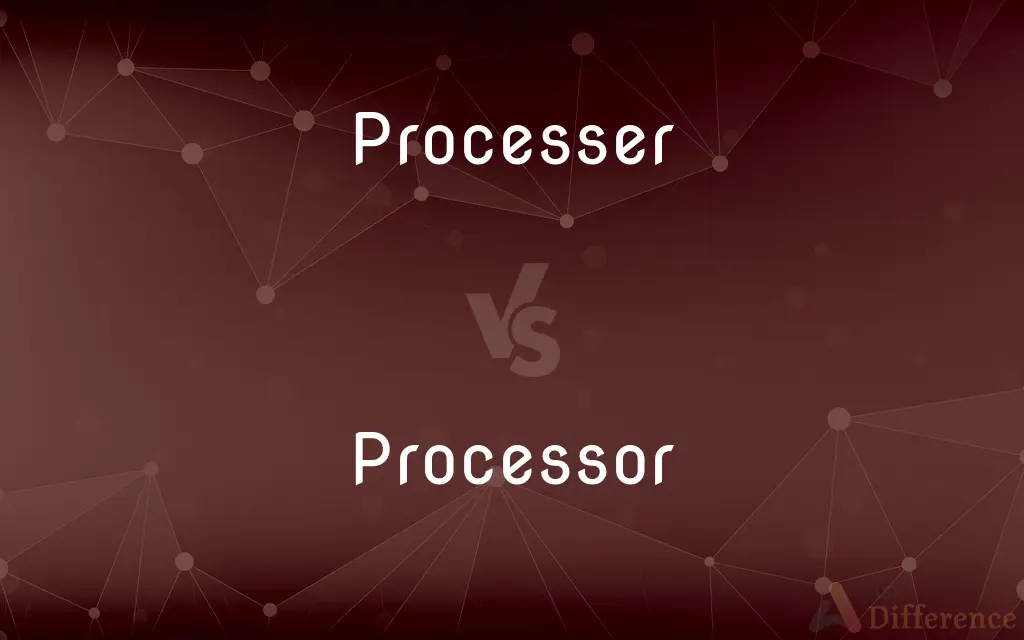Processer vs. Processor — What's the Difference?
By Tayyaba Rehman & Fiza Rafique — Updated on February 23, 2024
Processor refers to a computer component that interprets and executes instructions, while "Processer" is a common misspelling of "processor" and not a standard term.

Difference Between Processer and Processor
Table of Contents
ADVERTISEMENT
Key Differences
A processor, often called a CPU (Central Processing Unit), is the brain of a computer, handling instructions and operations. It's crucial for performing calculations, running software, and managing data flow. The term "processer" is typically a misspelling rather than a technical term, reflecting confusion or error in writing. This mix-up highlights the importance of accurate terminology in technology discussions.
Processors are categorized by their architecture, speed (measured in GHz), and the number of cores, which influences their ability to perform multiple tasks simultaneously. There's no category or specification for "processer" because it doesn't refer to an actual component or concept in computing.
Precision in language matters in technology discussion. When someone refers to a "processer," they're likely intending to discuss a processor. This slip can cause misunderstandings, especially for those learning about computer hardware.
Manufacturers like Intel and AMD produce a wide variety of processors, each designed for different computing needs, from basic web browsing to advanced gaming and data analysis. There is no equivalent variety or competition for "processer," as it doesn't represent a real category in computing technology.
Comparison Chart
Definition
A hardware component executing instructions
A misspelling of processor
ADVERTISEMENT
Usage
Central to computing devices
Incorrect terminology
Significance
Performs calculations, runs software
None
Varieties
Multiple types, speeds, cores
Not applicable
Manufacturers
Intel, AMD, etc.
Not applicable
Compare with Definitions
Processer
Incorrectly used in place of "processor" in discussions.
The forum post about the best processer for gaming needs correction.
Processor
Processors are measured in speed (GHz) and cores.
Gamers prefer processors with higher GHz and more cores.
Processer
Not associated with any computing tasks or operations.
A job listing requiring knowledge of processer technologies should be revised for clarity.
Processor
The efficiency of a processor affects the device's overall performance.
Energy-efficient processors reduce the need for frequent battery charges.
Processer
Lacks a manufacturing or brand association.
There are no processer brands, as it's a common misspelling of processor.
Processor
A processor interprets and executes computer instructions.
The latest smartphones use advanced processors for better performance.
Processer
Does not have technical specifications or models.
Searching for processer specs will likely redirect you to processor information.
Processor
A microprocessor.
This computer has two processors, but only one keyboard.
Processer
Often a typo when someone means to refer to a computer's CPU.
He accidentally typed processer while searching for processor upgrade options.
Processor
It's the central component of a computer, also known as the CPU.
Upgrading your computer's processor can significantly improve its speed.
Processor
Major processor manufacturers include Intel and AMD.
Intel's processors are popular in both consumer and professional computers.
Processor
A machine that processes something
The processor overexposed the film
Processor
A computer.
Processor
A central processing unit.
Processor
A program that translates another program or a data file into a form acceptable by the computer being used.
Processor
A central processing unit.
This mainframe's processor is fast.
Processor
(computer science) the part of a computer (a microprocessor chip) that does most of the data processing; the CPU and the memory form the central part of a computer to which the peripherals are attached
Common Curiosities
Can upgrading my processor improve computer performance?
Yes, upgrading to a more powerful processor can significantly improve your computer's performance.
Can a processor affect my computer's battery life?
Yes, more efficient processors can lead to better battery life by reducing power consumption.
How are processors measured?
Processors are measured by their clock speed (in GHz), number of cores, and architecture.
What's the importance of a processor in a computer?
A processor is crucial as it performs the calculations and processes necessary for running software and applications.
Are there different types of processors?
Yes, there are various types of processors designed for different computing needs, including general-purpose, graphics, and embedded processors.
Is "processer" a different type of technology?
No, "processer" is a common misspelling of "processor" and not a separate technology.
Who makes processors?
Companies like Intel and AMD are leading manufacturers of processors.
Does "processer" have any specific usage?
No, since "processer" is a misspelling, it doesn't have a specific or correct usage in computing.
What is a processor?
A processor, or CPU, is the primary component of a computer responsible for interpreting and executing instructions.
What's a common mistake when referring to processors?
A common mistake is misspelling "processor" as "processer."
How do I choose the right processor for my needs?
Consider your computing needs, such as gaming or professional tasks, and look for a processor with the appropriate speed, cores, and efficiency.
Can processors be upgraded in all computers?
While many desktops allow for processor upgrades, laptops and some compact computers have integrated CPUs that cannot be easily replaced.
Is there a "best" processor brand?
The best processor depends on your specific needs and budget; both Intel and AMD offer a range of options for different users.
Why is it important to use the correct terminology in technology?
Using accurate terminology helps avoid confusion and ensures clear communication, especially in technical discussions and documentation.
What is the role of processor cores?
Processor cores allow for multitasking and improved efficiency by handling multiple instructions simultaneously.
Share Your Discovery

Previous Comparison
Tonofilament vs. Tonofibril
Next Comparison
Tantalising vs. TantalizingAuthor Spotlight
Written by
Tayyaba RehmanTayyaba Rehman is a distinguished writer, currently serving as a primary contributor to askdifference.com. As a researcher in semantics and etymology, Tayyaba's passion for the complexity of languages and their distinctions has found a perfect home on the platform. Tayyaba delves into the intricacies of language, distinguishing between commonly confused words and phrases, thereby providing clarity for readers worldwide.
Co-written by
Fiza RafiqueFiza Rafique is a skilled content writer at AskDifference.com, where she meticulously refines and enhances written pieces. Drawing from her vast editorial expertise, Fiza ensures clarity, accuracy, and precision in every article. Passionate about language, she continually seeks to elevate the quality of content for readers worldwide.














































